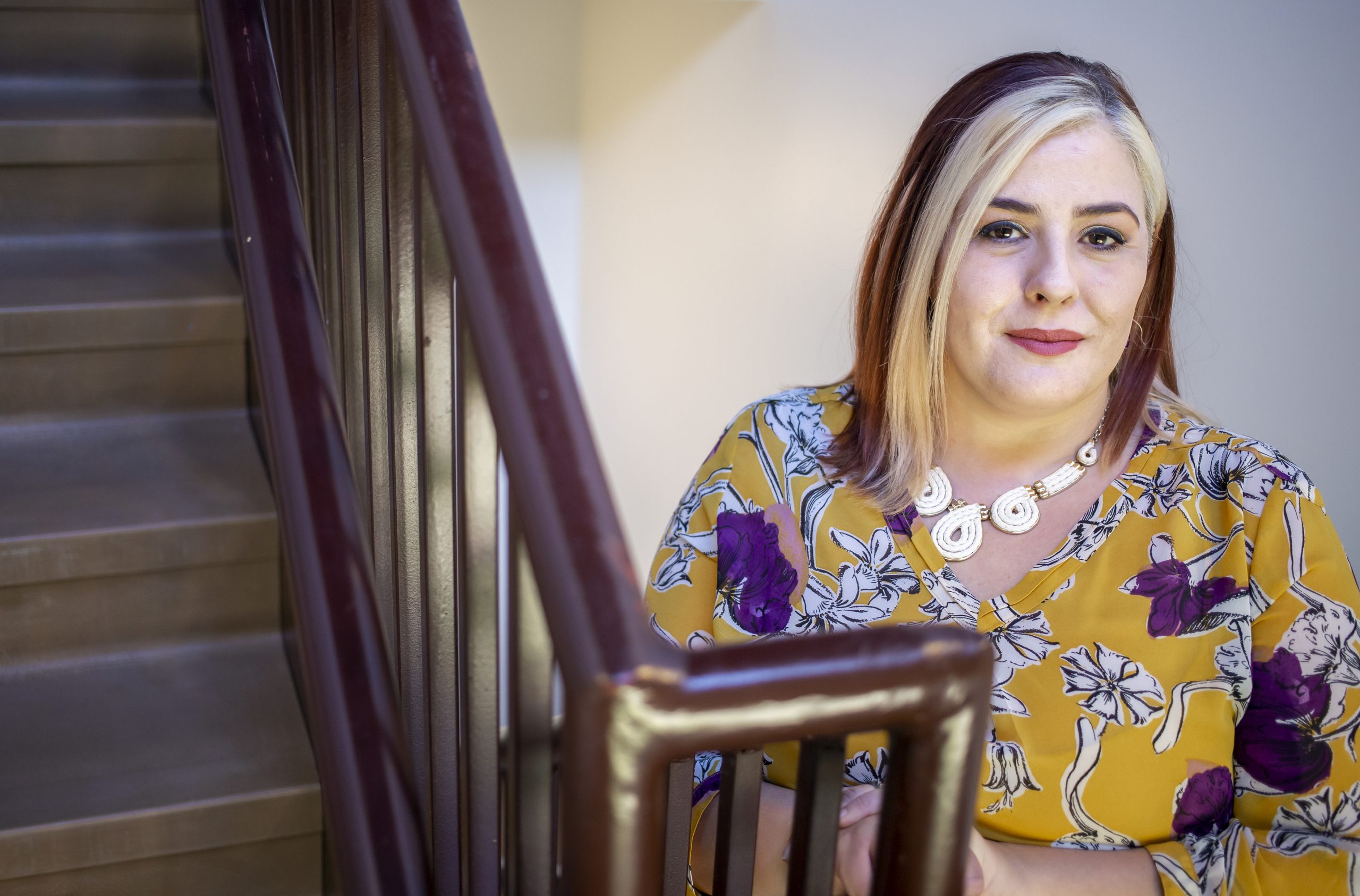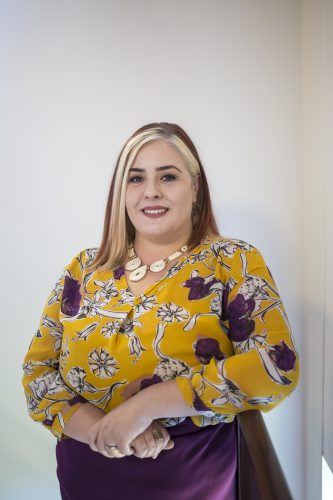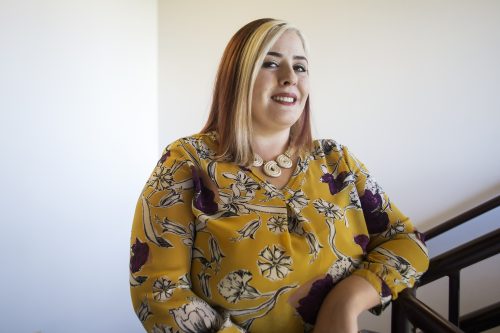Market Values
Rosemarie Fike studies the link between the economy and ethics.

Rosemarie Fike, instructor II of economics, wasn't necessarily against President Biden's effort to wipe out student debt, but the policy would have had ethical implications. Photo by Mark Graham
Market Values
Rosemarie Fike studies the link between the economy and ethics.
In August 2022, President Joe Biden announced plans to wipe out up to $20,000 of student loan debt for millions of borrowers. The decision drew praise from an untold number of people saddled with federal loan debt.
Others, including Rosemarie Fike, instructor II of economics at TCU, cautioned that the government’s paternalistic market interference may ultimately do more harm than good. She warned that the policy could dissuade students from owning up to poorly calculated education decisions.
To be clear, Fike herself wasn’t necessarily coming out against the plan. Had the Supreme Court not struck down the program, she would have received up to $20,000 in loan forgiveness.
But the meddling, she said, matters.
“Part of becoming a moral individual, a virtuous individual, is making sure that when you make a bad choice, that you do suffer the consequences of that bad choice so that it’s not repeated in the future,” Fike said. “When we insulate people from making bad choices, we call that a moral hazard.”
As an economist, she considers the broader economic impact of such government decisions. Would loan forgiveness cause students to devalue education? Would students grow to depend on government for bailouts?
This line of questioning was the focal point of Fike’s essay “Do Disruptions to the Market Process Corrupt Our Morals?” published in The Review of Austrian Economics in January 2022.
Fike teaches the Contending Perspectives in Economics course, which she designed around the idea of academic pluralism; debate is encouraged.
“Even if you disagree, we can be respectful and try to understand where the disagreements come from,” Fike said. “In that class we read Adam Smith; we read ideas by Karl Marx and John Maynard Keynes. We talk about lots of intellectuals that are known for disagreeing with each other.”
The essay is a byproduct of Ginny Choi and Virgil Storr’s book Do Markets Corrupt Our Morals? The authors conclude that the market process results in outcomes that can be considered moral. Fike agrees.
Civilizing Effect on Character
Fike wanted to extend Choi and Storr’s argument to answer whether disruptions to the market process corrupt morals.

Rosemarie Fike teaches Contending Perspectives in Economics, which she designed around the idea of academic pluralism. Photo by Mark Graham
Fike based her essay on four main assertions. First, interference prevents people from accessing the benefits markets can provide. Second, disruptions to the free market create incentives that encourage people to practice behaviors considered immoral. Third, disruptions prevent people from participating in the development of their moral character. Finally, impeding the market prevents people from discovering new, morally superior social rules.
Much of her argument has philosophical roots in the works of Smith, David Hume and John Stuart Mill, who argued that participating in markets has a civilizing effect on character. She writes that a free market is a key part of capitalism. Participating in the free market and capitalism, she said, is a voluntary process.
“In order for me to succeed in the marketplace, I have to convince people to part with their dollars,” Fike said. “I have to convince them that what I’m doing for them is more valuable than the dollars that they have.”
In the words of Walter Williams, one of Fike’s favorite economists: “Prior to capitalism, the way people amassed great wealth was by looting, plundering and enslaving their fellow man. Capitalism made it possible to become wealthy by serving your fellow man.”
The Slavery Counterargument
A long scholarly debate about slavery’s role in capitalism has complicated the relationship between markets and morals. Williams, a Black scholar who died in 2020, argued that capitalism as an economic modality replaced slavery.
Countercommentaries, however, show how slavery bankrolled today’s capitalism by laying the foundation for modern tax systems, financial industries and consumer economies.
“The labor market often provides the greatest challenge to an idealized free-market society, and the extreme case of slavery helps to see why this is the case,” said Gavin Wright, a Stanford University emeritus economist, historian and author of Slavery and American Economic Development.
“The condition of slavery, especially inherited slavery,” he said, “is clearly not a voluntarily transacted state of affairs.”
Two centuries ago, U.S. banks sold securities to fund the expansion of plantations. Companies including New York Life, AIG and Aetna sold insurance policies that would compensate slave owners if the people they had enslaved were injured or killed.

“When you have people who are enslaved and they’re not able to make decisions over how to spend their time or how to use their own talents, we are all poorer for that,” Rosemarie Fike said. Photo by Mark Graham
U.S. banks have made public apologies for their role in slavery. In 2005, JPMorgan Chase admitted that two of its subsidiaries accepted enslaved people as collateral for loans. Citibank, Bank of America and Wells Fargo also have roots linked to the slave trade.
For the record, Fike does not minimize the inhumanity of slavery. She said the problem of slavery supports the core argument of her essay because the system restricted people from participating in the market.
“Scholars like John Stuart Mill, very early on, were big advocates for abolishing slavery,” Fike said. “When you have people who are enslaved and they’re not able to make decisions over how to spend their time or how to use their own talents, we are all poorer for that.”
Yet society can’t escape the need for governmental involvement in the market, Wright said, citing slavery as an example. “If slavery is abolished, someone has to enforce the prohibition, which is indeed a restriction on the full range of available transactions.”
Even today, “if we observe a long-term relationship that looks abusive, say when someone is kept in a house 24 hours and shows signs of being beaten, it may not be that easy to prove that the relationship is not voluntary. But shouldn’t someone with authority make that determination?”
“I do not think that markets are perfect, nor do I think they are guaranteed to self-correct all of the time,” Fike said. “They regularly fail in a variety of ways, but we need to think about how the alternative process works in reality. We don’t want to compare an imperfect market outcome with an idealized view of how the political process might be used to improve that outcome.
“We need to acknowledge the incentives that political interventions create, and those incentives often encourage behavior that we would not consider virtuous and lead to outcomes that are not improvements over the market outcome.”
In a previous study, Fike found that restrictions on women’s rights are more severe in countries with less economic freedom. “The places that are more market-oriented are places where women have more economic rights overall,” she said.
This principle was true during the U.S. Industrial Revolution. The Northeastern states had a booming textile industry, but they desperately needed women to work in the factories, she said. “And why on earth would I go accept a job if all the money I earn is my husband’s property and not mine?”

Your comments are welcome
Comments
Related reading:
Features
Conduit for Learning
Electrical engineering interns assess the campus power grid.
Research + Discovery
Obstacles to Education
Experiences of Black students and parents are at the center of Endia Lindo’s book.
Features
Survival Story
Evoking empathy through dance on film, Suki John shares her family’s Holocaust trauma.